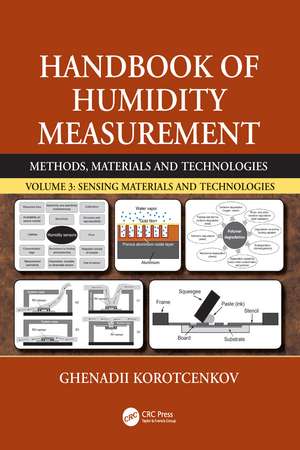Handbook of Humidity Measurement, Volume 3: Sensing Materials and Technologies
Autor Ghenadii Korotcenkoven Limba Engleză Hardback – 4 feb 2020
Additional features include:
numerous strategies for the fabrication and characterization of humidity-sensitive materials and sensing structures used in sensor applications,
methods and properties to develop smaller, cheaper, more robust, and accurate devices with better sensitivity and stability,
a guide to sensor selection and an overview of the humidity sensor market, and
new technology solutions for integration, miniaturization, and specificity of the humidity sensor calibration.
Handbook of Humidity Measurement, Volume 3: Sensing Materials and Technologiesprovides valuable information for practicing engineers, measurement experts, laboratory technicians, project managers in industries and national laboratories, and university students and professors interested in solutions to humidity measurement tasks. Despite the fact that this book is devoted to the humidity sensors, it can be used as a basis for understanding fundamentals of any gas sensor operation and development.
| Toate formatele și edițiile | Preț | Express |
|---|---|---|
| Paperback (1) | 467.54 lei 6-8 săpt. | |
| CRC Press – 13 dec 2021 | 467.54 lei 6-8 săpt. | |
| Hardback (1) | 948.00 lei 6-8 săpt. | |
| CRC Press – 4 feb 2020 | 948.00 lei 6-8 săpt. |
Preț: 948.00 lei
Preț vechi: 1338.74 lei
-29% Nou
Puncte Express: 1422
Preț estimativ în valută:
181.42€ • 188.71$ • 149.77£
181.42€ • 188.71$ • 149.77£
Carte tipărită la comandă
Livrare economică 15-29 aprilie
Preluare comenzi: 021 569.72.76
Specificații
ISBN-13: 9781138482876
ISBN-10: 1138482870
Pagini: 502
Ilustrații: 427
Dimensiuni: 210 x 280 mm
Greutate: 1.39 kg
Ediția:1
Editura: CRC Press
Colecția CRC Press
ISBN-10: 1138482870
Pagini: 502
Ilustrații: 427
Dimensiuni: 210 x 280 mm
Greutate: 1.39 kg
Ediția:1
Editura: CRC Press
Colecția CRC Press
Cuprins
Section i Humidity-Sensitive Materials
Chapter 1 Polymers .................................................................................................................................................................. 3
Chapter 2 Metal Oxide in Humidity Sensors ......................................................................................................................... 23
Chapter 3 Al2O3 as a Humidity-Sensitive Material ............................................................................................................... 35
Chapter 4 Carbon-Based Materials ........................................................................................................................................ 51
Chapter 5 Semiconductor-Based Humidity Sensors .............................................................................................................. 91
Chapter 6 Porous Silicon ...................................................................................................................................................... 109
Chapter 7 Mesoporous Silica and Its Prospects for Humidity Sensor Application ............................................................ 139
Chapter 8 Aluminosilicate (Zeolites)-Based Humidity Sensors ........................................................................................ 151
Chapter 9 Metal Phosphate-Based Humidity Sensitive Materials ...................................................................................... 163
Chapter 10 Black Phosphorus and Phosphorene-Based Humidity Sensors ..........................................................................171
Chapter 11 Metal-Organic Framework-Based Humidity Sensors ........................................................................................ 187
Chapter 12 Supramolecular Materials .................................................................................................................................. 209
Chapter 13 Biomaterials as Sensing Elements of Humidity Sensors ................................................................................... 223
Section ii Sensor technologies and Related Materials
Chapter 14 Substrates and Electrodes in Humidity Sensors ................................................................................................ 229
Chapter 15 Fundamentals of Microfabrication Technologies...............................................................................................
Chapter 16 Micromachining Platforms for Humidity Sensors and Examples of Their Fabrication .................................... 263
Chapter 17 Platforms and Materials for QCM and SAW-Based Humidity Sensors ............................................................ 271
Chapter 18 Technologies Suitable for Fabrication of Humidity Sensing Layers: General Consideration ............................ 281
Chapter 19 Polymer Technologies ........................................................................................................................................ 305
Chapter 20 Synthesis of Humidity-Sensitive Metal Oxides: Powder Technologies ............................................................. 339
Chapter 27 Comparative Analysis of Humidity Sensors and Their Advantages and Shortcomings ................................... 445
Chapter 28 Market of Electronic Humidity Sensors ............................................................................................................ 453
Chapter 1 Polymers .................................................................................................................................................................. 3
Chapter 2 Metal Oxide in Humidity Sensors ......................................................................................................................... 23
Chapter 3 Al2O3 as a Humidity-Sensitive Material ............................................................................................................... 35
Chapter 4 Carbon-Based Materials ........................................................................................................................................ 51
Chapter 5 Semiconductor-Based Humidity Sensors .............................................................................................................. 91
Chapter 6 Porous Silicon ...................................................................................................................................................... 109
Chapter 7 Mesoporous Silica and Its Prospects for Humidity Sensor Application ............................................................ 139
Chapter 8 Aluminosilicate (Zeolites)-Based Humidity Sensors ........................................................................................ 151
Chapter 9 Metal Phosphate-Based Humidity Sensitive Materials ...................................................................................... 163
Chapter 10 Black Phosphorus and Phosphorene-Based Humidity Sensors ..........................................................................171
Chapter 11 Metal-Organic Framework-Based Humidity Sensors ........................................................................................ 187
Chapter 12 Supramolecular Materials .................................................................................................................................. 209
Chapter 13 Biomaterials as Sensing Elements of Humidity Sensors ................................................................................... 223
Section ii Sensor technologies and Related Materials
Chapter 14 Substrates and Electrodes in Humidity Sensors ................................................................................................ 229
Chapter 15 Fundamentals of Microfabrication Technologies...............................................................................................
Chapter 16 Micromachining Platforms for Humidity Sensors and Examples of Their Fabrication .................................... 263
Chapter 17 Platforms and Materials for QCM and SAW-Based Humidity Sensors ............................................................ 271
Chapter 18 Technologies Suitable for Fabrication of Humidity Sensing Layers: General Consideration ............................ 281
Chapter 19 Polymer Technologies ........................................................................................................................................ 305
Chapter 20 Synthesis of Humidity-Sensitive Metal Oxides: Powder Technologies ............................................................. 339
Chapter 27 Comparative Analysis of Humidity Sensors and Their Advantages and Shortcomings ................................... 445
Chapter 28 Market of Electronic Humidity Sensors ............................................................................................................ 453
Descriere
This useful handbook offers an analysis of humidity-sensitive materials along with fabrication and design challenges that may arise in manufacturing and solutions via available new technology. A guide to sensor selection and an overview of the humidity sensor market concludes the work.
